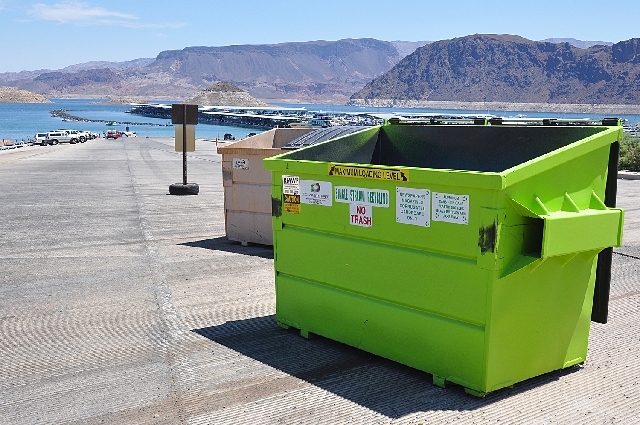New park programs see recycling up, water bottle usage down
The recycling program at the Lake Mead National Recreation Area has seen a 20 percent increase in the past three months, the park service recently announced.
Park service officials credit the installation of single-stream, no-sort recycling for the increase.
More than 30 single-stream dumpsters have been placed around Boulder Beach, Callville Bay and Katherine Landing, allowing visitors to throw all of their recyclables into single bins.
David Hughey, the park’s field operations supervisor, said this program will help the park meet the Department of Interior’s goal to divert at least 50 percent of nonhazardous solid waste by fiscal year 2015.
“Every place there has been a dumpster, we will add a single-stream dumpster,” Hughey said. “They’ll be at every trailhead, all campgrounds and picnic areas.”
The program is run by BC Waste Free, the same company that runs Boulder City’s residential and commercial recycling program.
The 1.5 million-acre park welcomes more than 6 million visitors each year, and with that visitation comes more than 300 tons of municipal waste. In 2012, the park recycled 95 tons, a diversion rate of 30.58 percent.
All nonhazardous waste can go into the dumpster except for clothes, food, wax-coated cups, Styrofoam and yard waste. Everything else from plastic to metal to glass is recyclable.
“It’s been pretty amazing,” said Hughey. “In some places, we’re doubling up on the dumpsters because of the success.”
The bright green dumpsters are easy to spot, and they’re clearly labeled with information about what to recycle. Traditional trash dumpsters are located beside the single-stream dumpsters to collect any remaining garbage.
Shannon Swann, the park health officer, said new recycling programs have been added for park employees, as well. In addition to placing single-stream dumpsters near office buildings, employees can now recycle batteries, fluorescent light bulbs and toner cartridges in the warehouse bay.
“Overall, we’re reducing what goes into the landfill,” she said.
Park employees have encouraged recycling for years. Wooden bins made by Eagle Scouts are still scattered throughout the park in areas where the new dumpsters haven’t been placed yet. Hughey said they were installed as a trial program to see if the public would recycle.
“It worked. The public is willing to do this,” he said. “It’s easy now, so people are doing the right thing. We’re doing the right thing. Continue doing what you’re doing.”
Single-stream dumpsters will continue to be added throughout the park. The plan is to have 100 in place by next summer.
While recycling has increased, another new program has prevented more waste from entering the park.
In six months, recreation area visitors have kept more than 13,600 water bottles out of landfills by using a new hydration station at the Alan Bible Visitor Center.
The hydration station provides visitors with cold, filtered water and functions as a standard drinking fountain. It also has a shelf with a sensor that initiates every time a bottle is filled, it is automatically counted and displayed on the station.
“Word is getting around that this is the place to stop and refill your water bottle, which with the heat and everything else, that’s a really good message to have,” said Michelle Riter, a Lake Mead National Recreation Area district interpreter.
The visitors’ center stopped selling bottled water at its store once the refilling station was installed. Instead, the park began selling more varieties of refillable water bottles. She said the least expensive water bottle is only $2.99 and has the park’s logo on it along with facts about the park.
















